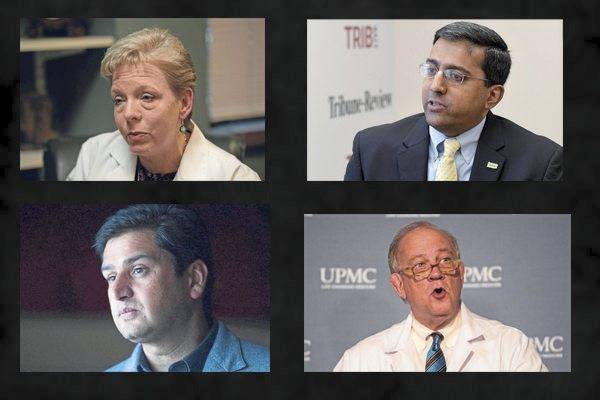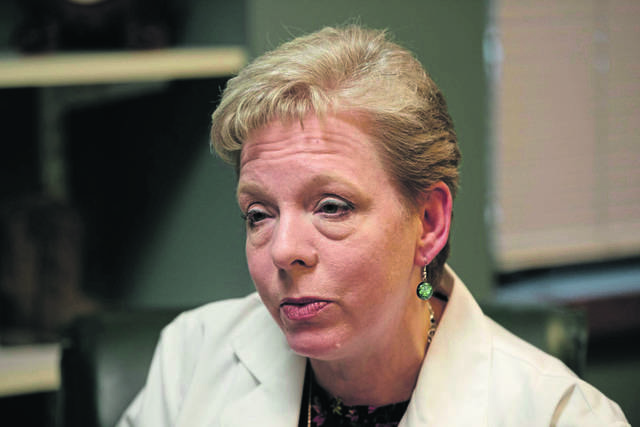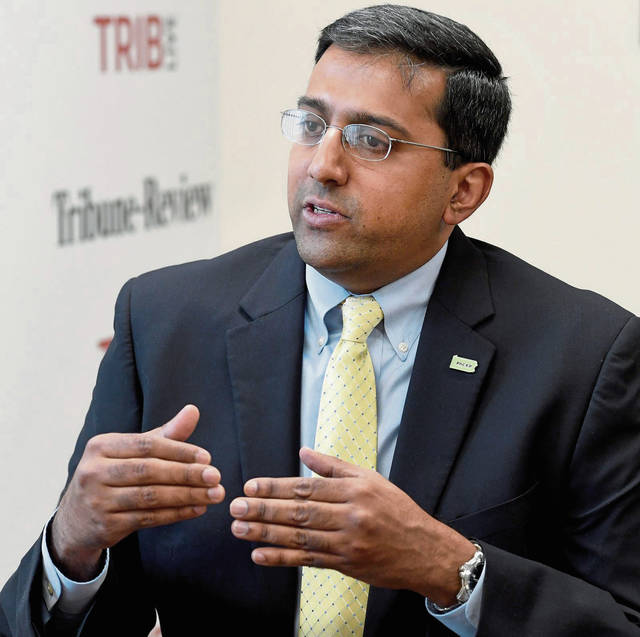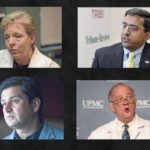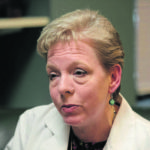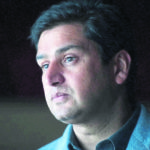Earlier this year, President Donald Trump called the coronavirus fight a “war” with an “invisible enemy.”
While some have argued that may not be the best analogy, no one could blame the health professionals who have risen to the task of dealing with the pandemic for feeling embattled.
In Southwestern Pennsylvania, a handful of medical experts have taken up visible leadership roles in the fight to contain the spread of covid-19 in the region.
The Tribune-Review last week asked some of those individuals how the pandemic has impacted their lives both personally and professionally, and what they expect to see with the total number of cases back on the rise.
Dr. Carol Fox
If any doctor truly understands the toll covid-19 can take on a family, it’s Dr. Carol Fox, Excela Health chief medical officer. Fox’s 29-year-old son Sam contracted the novel coronavirus in March while working as an internal medicine resident at Rush University Medical Center in Chicago.
“He is a young healthy person who was infected early on in the course of things. So perhaps, if he was infected later, I might have been more anxious because in the beginning we were learning about it and assuming that the vulnerable populations were elderly,” Fox said.
She said as time has progressed, she is seeing covid-19 is a fickle disease.
“Some people get it and they get relatively minor symptoms or it feels like a bad flu. But then you see other individuals who are relatively healthy and get extremely ill. You look at the patients who get sicker than you think they should, based on their underlying health, and think, ‘Wow, I’m glad that didn’t happen to Sam.’ ”
Fox said her son believes he was exposed to the disease by a colleague and brought it home and infected his wife. Fox said it was a tough time made even more difficult by having to check up on her son and daughter-in-law from a distance.
“I’m calling him and his wife a couple of times a day and asking them ‘show me your faces on FaceTime. I want to make sure that you’re not turning blue,’ ” she said.
Fox said the pandemic has presented professional challenges as well and the nature of the crisis is weighing on her heavily as it evolves.
“Initially when this all first started back in March, we were all working on all cylinders all the time, working seven days a week. It’s the nature of my job but this is different and stressful. No one knows for sure what the right answers are because covid is so new and the science is evolving. If I make a recommendation that turns out to not be a good idea, am I putting patients and staff at risk?”
She said reports of rising case numbers have left her with a fear of what the hospitalization and death toll numbers might look like in coming weeks.
“It’s the fear of the unknown,” said Fox. “We went for multiple weeks having no covid patients in the hospital and then we had one for a couple days, then two for a couple days and we have several positive in house today (Thursday). It’s climbing up bit by bit and it’s disturbing.”
Dr. Arvind Venkat
Dr. Arvind Venkat is an Allegheny Health Network emergency physician and past president of the Pennsylvania College of Emergency Physicians. Concerned about the rising case numbers, he called for people to do everything possible to stop the spread of the disease immediately. Without rapid action, hospitalizations and deaths will rise as well.
“I get that no one likes being told what they have to wear and what they have to do, in our society which prides itself on liberty,” Venkat said. “But those types of concerns have to take a backseat, in my opinion, when we have a highly contagious disease.
“The idea of individual liberty is very important, but it’s also important to recognize that with an infectious disease what I do is directly going to affect you — and what you do is directly going to affect me.”
Venkat strongly believes the public needs consistent messaging from political leaders and the media that is grounded in scientific evidence.
“This is a respiratory virus and the way to stop its transmission is to practice social distancing, wear face masks, wash our hands and avoid touching our faces. That’s what the evidence shows and that’s what we can do to get back to normal,” Venkat said. “It’s also important for the media to tell the stories of patients who have experienced this disease and show that despite their best efforts, they got the disease and how severe it was.”
Venkat said the challenges posed by the coronavirus are what he and his colleagues have trained for.
“This is something that we are prepared for,” he said. “This is not the first time we’ve had to confront either a new infectious disease or a new public health crisis. It’s what our calling is and what we take pride in doing on behalf of the public.”
On a personal level, Venkat said dealing with covid-19 has been stressful both mentally and physically.
“Now when I go into an emergency department, I don’t just carry my white coat and stethoscope, I carry my N-100 mask, I carry my face shield. I never had to do that before,” he said. “I’m wearing a surgical mask with every patient and every patient is wearing a surgical mask. That’s something that’s new as well and it creates certain mental stresses.”
Dr. Donald Yealy
The fact that the virus has not gone away is not a surprise for Dr. Donald Yealy, UPMC’s chair of emergency medicine.
“What we’ve seen in the past few weeks is that while cases are clearly rising, and in Allegheny County higher than they were at the peak, the actual illness severity is not anything like what we saw at the peak,” Yealy said. “So, we are still using only a very small fraction of hospital beds and intensive care beds on patients with covid-19 infection and illness.”
Yealy does not expect cases to rise to an amount that will put a strain on the hospital system.
“My knowledge not only of UPMC but other health care providers in Pennsylvania is that no one is currently stretching hard to provide care to covid-19 infected patients. The severity of cases doesn’t seem to be quite as high as it once was.”
Yealy said this has been the most challenging time of his 35-year career as a physician.
“There is an intense amount of concern, a high volume of people with very specific types of infections plus all the background emergencies that I deal with in my regular line of work in emergency medicine.”
But Yealy said this has also been one of the most uplifting times of his career.
“I’ve never seen the level of professional cooperation, really focusing on how we can do our jobs the best way possible. I think difficult times bring out the best in people. It sounds hokey, but I’m very proud of the partners that I work with, not only on the emergency care side but throughout the health system.”
Yealy said the personal toll the pandemic has taken is that he never seems to be able to get away from it.
“You’re never really off-duty. I answer questions not only at work but when I am at my son’s baseball or hockey game or out in other settings. People have areas where they want a little more insight, a little more reassurance and it’s my job to answer that. It’s all covid all the time and I hope I can look back fondly in a year or two years about what we did and how we responded.”
Dr. Amesh Adalja
Pittsburgh-based infectious disease and critical care physician Dr. Amesh Adalja has emerged as a highly-sought-after covid-19 expert across the nation. A senior scholar at the Johns Hopkins Center for Health Security, Adalja works on pandemic preparedness, emerging infectious diseases and hospital preparedness.
Adalja said he is not surprised to see upwards of 100 new cases or more being reported in Allegheny County.
“The virus didn’t go anywhere. This is something that has established itself in the human population. So, anytime people socially interact, you should expect to see transmission events. People shouldn’t be shocked by that number of cases.”
As someone who works on pandemics, Adalja said the covid-19 crisis has become his “entire life” since January.
“Not only do I see patients with this and take care of patients in different settings, I also work at a think tank that was founded in response to pandemics. So, I have been publishing papers, writing reports, coming up with strategies and constantly talking to the public on television, radio and in print and giving lectures and webinars on this.”
As for any particular toll his immersion in the covid-19 pandemic might be taking on Adalja’s personal life, he offered up a self-described “nerdy” answer.
“I don’t really have any other life other than my professional one. I follow viruses the way people follow sports teams,” he said. “How it affects me personally is I’m not spending time on all the other viruses I love. I don’t have time to think about the G4 influenza swine virus that’s emerging in China. I want to spend more time thinking about that. I want to think about antibiotic resistance. I want to think about vaccine policy.”
As for the coronavirus pandemic, Adalja calls it a major worldwide wake-up call.
“People have minimized the risks of pandemics and thought that we were kind of out of the era of pandemics. Now we’re seeing the full consequences. It didn’t have to be the way it is if preparation and execution of pandemic plans were something that was prioritized by the federal government as well as some state governments.
“Hopefully the scar that this pandemic leaves on this country will allow it to refigure how much priority it gives to pandemic preparedness.”


